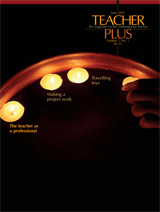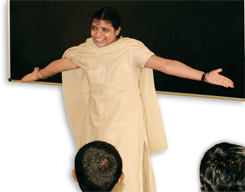
Meghana Rao
Why should the teacher be perceived as a professional? Of all professions, teaching is perhaps the most complex and the most difficult to practise. It is the only profession that nurtures human skills and capacities which help societies to thrive. In a country that is rapidly growing as a knowledge economy, why are teachers still relegated to the background? With salaries of all other professions touching the roof, teachers continue to be ill-paid and unrecognised.
Chalk dusted fingers holding a red ink pen, marking and (in books pulled from one pile before putting them into another pile?), answering questions ranging from ‘Teacher, how to solve this problem?’ to ‘Teacher, where is the toilet?’ and attempting the herculean task of holding the attention of a class full of energetic children. This is obviously not an easy job! So why is it that we so often hear people asking, “If you are worth something why would you be working as a teacher?”

“It is a remark uttered by most people when they refer to teachers,” says Gurveen Kaur, founder, Centre for Learning, Hyderabad. Although this opinion is popular, it holds no base simply because societies (including parents) are highly dependent on teachers. This is not to say that parents do not take responsibility of their child; but once the child enters the school compound, the teacher has to take over. She is expected to take over and handle many screaming, crying, giggling, energetic, rebellious children at one time. She has to be patient and understanding. AND she has to educate these children and prepare them for the world outside.
It is therefore clear that teachers have to be there in numerous ways for the children. “Many times teachers are like second mothers,” says Salma Sultana, a teacher at Icfai Republic School (IRS), Hyderabad. “Most of the child’s day is spent in school and ten to twelve years of the child’s life are also within a school’s compound, so teachers do have an important role to play,” adds Nirmala, another teacher.
Given that teachers have a significant impact on a child’s life, can teachers be called professionals? What is it that makes an individual a professional? “Commitment and discipline and a feeling of selfworth are what make a professional. Especially for school teachers, self-worth is extremely important,” says Sheela Ramakrishnan, a teacher trainer based in Hyderabad. Sandhya Siddharth, who works with A.V. Education Society, Bangalore, says, “A professional is one who has knowledge, a sense of accountability, is respectful, is self-driven and is willing to learn constantly.”
Although more such definitions exist, running in parallel are other social and cultural factors that add to the stereotypical understanding about teachers that act against teaching being called a profession. One is that teaching is considered as a noble profession, even a vocation. The point is that such a perception lends itself to the belief that teachers should only give; money is not to be considered. Teaching must be rewarding in itself. Another factor, as Maya Menon of The Teacher Foundation, Bangalore, points out, is that “[Teaching] is a highly gender-biased profession – biased towards women who are traditionally seen as home-makers.” This contributes to teaching being seen more as a ‘convenient’ occupation for women rather than a challenging profession for both sexes.
A third very important factor is that a teacher’s salary continues to be extremely low (sometimes as low as Rs.1000 per month). Consequently, the income is considered as a second income to the family. And in a patriarchal society like ours, this works against attracting both the sexes into the teaching field. “Although money is not the only criterion, it nevertheless matters. Because, with as much hard work, if not less, people from other professions are getting paid higher,” says Sheela Ramakrishnan. And when weighed against the salary that teachers receive, their work load is extremely heavy. Many have to invariably take work back home.
Besides, there is no growth in this field, unlike in others. Promotions are few and far between. “The highest a teacher can move up in the ladder is to become a Head of Department, a class teacher, a vice-principal or a principal. And many times these positions are occupied by the school owners. There are no incentives to attract the teachers to push themselves to do better,” says Ramakrishnan. Further observation shows that, even though some teachers enjoy support from their families, when there is a crisis in the family, perspectives change. “Some of our teachers do have excellent support from their families to keep their jobs going even through trying times with husbands, mothers-in-law, fathers-in-law stepping in for them. What is worrying is that when there is a crisis in the family then the first casualty is the woman’s job, in this case the teacher,” says Siddharth.
Complete disregard
In spite of all the energy and time that is spent, most people, including school managements, do not stop to think about the conditions in which teachers work. Their problems are rarely discussed. “The teacher’s role is crucial in improving the quality of education in a school, because the core agenda of schooling is curriculum and how it is delivered. Both these areas are determined by the teacher’s skills and competencies. By and large less than enough time and money are invested in improving their 8 JUNE 07 TEACHER PLUS competencies,” says Sandhya Siddharth. Adds Gurveen Kaur, “Many schools do not hire an adequate number of teachers; hence a small number has to cater to large classes. This leaves teachers with very little time to prepare; consequently, they are forced to carry work back home. When this occurs, the quality of teaching suffers.” This vicious cycle has existed for several decades now.
Teachers are not recognised as people who have special training or talent to conduct their jobs. “Especially in elementary education, the perception is that mothers can train and teach, all it needs is common sense, no additional training or understanding is required and ‘if women are doing it, then it ought to be simple and easy.’ The thinking is that young children do not need much attention in terms of teaching or training. ‘They will learn anyway’ is the attitude. Hence the pay is low,” says Gurveen. To add to this, educational institutions today have become business ventures. “More and more schools come up because it’s a sure way of making money,” says Vijayshri Malladi, teacher, IRS. As profit is the goal, many crucial aspects are ignored. Salaries happen to be one of them. Apart from not attracting talented people, the enormous work loadlow pay combination deters many from the younger generation from taking up teaching. There is a need to attract more enthusiastic youngsters into the field.
Although there is a general improvement in the attitude towards teachers, the process is very slow and is occurring only in certain pockets. This change seems to be corresponding with the change in teaching patterns. Today one can find examples to support the argument that schools are trying to make teaching child-centric rather than teacher-centric. “Children have the space and a voice to express themselves and their ideas. Teaching has become less dictatorial and more interactive,” says Vijayshri Malladi. Nowadays some schools offer regular workshops for teachers; they organise group discussions and also employ teacher trainers who help improve the teaching conditions for children. Such changes will encourage teachers to take more interest in their job. “In our schools, we have regular workshops for teachers. Art of Living courses, English and Phonetics are taught to the teachers and then we teach the students. Interest in teaching is kept alive. Also, teachers interact with other teachers, and learn from each other,” says Saheia Tabbasum, science teacher from IRS. However the fact remains that there is much more to be done for teachers to be recognised as professionals.
Changing the situation

How does one counter the social and cultural stereotypes that exist about teachers? One step could be to establish a recognised professional body. Teachers in India do not have a body that they can belong to. This would help a great deal, because then teachers would have an avenue to speak out, discuss and address their problems. Such a body will also be able to take appropriate measures to better the conditions for teachers and help gain recognition as professionals. “The absence of such a professional body also negates the need to pursue sustained professional development,” says Maya Menon.
“Other steps could be to provide regular increments, to involve teachers in the school’s decision making process, provide recognition to teachers through certificates, offer a platform for teachers to share and learn from each other’s experience and so on,” says Sandhya Siddharth. There are many such innovative ideas emerging today. “Rotational leadership helps in involving the teachers more. Also some growth in the institution is possible for the teachers who are otherwise stagnant in terms of the position they hold in the institution. If the teacher has some responsibility, more and more innovative ideas emerge for the school and children,” says Sheela Ramakrishnan.
Yet, there is one crucial change that educational institutions and people involved have to make. Attitude. “There needs to be a change in the attitude of the parents towards the teachers, in the attitude of the management towards the teachers, and of society in general towards teachers. Attitude change will bring about all the necessary logistical changes within the teaching community,” says Sheela Ramakrishnan. This process can be initiated by teachers themselves. “Teachers must learn to treat themselves with more respect and as professionals. They must recognise their own importance. They must understand the role they play in children’s lives,” says Gurveen Kaur. Teachers too should make an effort to change the popular perception that the job is easy, by regularly updating oneself, by evolving innovative methods to keep the classroom alive, thus making the best of this profession. “The change must be made by the teacher herself. S/he must tell herself or himself that they are professionals and that they need to maintain a connection with what’s happening in the outside world with regard to education. Since the curriculum remains the same for years, monotony sets in. As they already have a tried and tested method, they keep following it 9 JUNE 07 TEACHER PLUS without any thought. This attitude needs to change. Teachers must try and break this monotony by changing the teaching methods in classrooms,” says Sheela Ramakrishnan. If such changes come about, teachers will gain more respect and recognition in their field.
When we look back, we can remember only a few of the people who have taught us nursery rhymes, who have taught us the difference between the alphabet ‘a’ and ‘A’, how to add 2 + 2, the names of the nine (or should I now say eight) planets, Shakespeare’s poetry and drama, or that litmus paper changes colour, or logarithms, the people who have taught us more things than can be mentioned here! Engineers, doctors, astronomers, civil servants, journalists, corporate workers – almost every person who is considered a professional has stepped out into the real world after spending a considerable amount of time in a school with teachers. It is time to recognise this and take appropriate steps to treat teachers as professionals who make other professionals.
